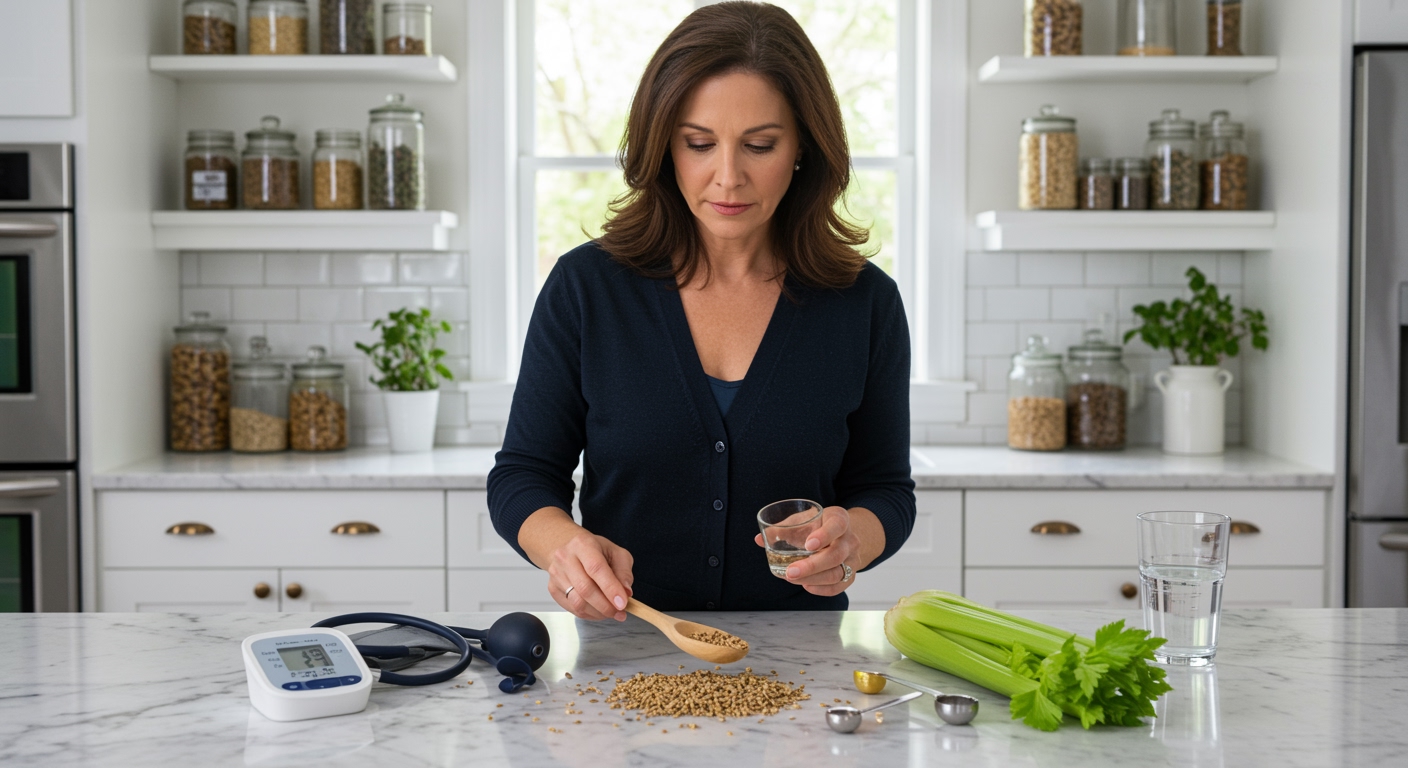✪ Key Takeaway: Hypotension patients should avoid celery seeds as they can further lower already low blood pressure levels.
Introduction
Your blood pressure drops to 85/55 mmHg and you feel dizzy again.
You might wonder if that celery seed seasoning you sprinkled on your soup yesterday made things worse.
Hi, I’m Abdur, your nutrition coach and today I’m going to explain exactly how celery seeds affect low blood pressure and whether you should avoid them completely.
How Do Celery Seeds Lower Blood Pressure?
Celery seeds contain powerful compounds called phthalides that directly affect your cardiovascular system.
These natural chemicals work by relaxing the smooth muscles in your blood vessel walls.
When your blood vessels relax and widen, your blood pressure naturally decreases.
Research shows that celery seed extract can reduce systolic blood pressure by 7-14 mmHg in people with normal or high blood pressure.
The active compound 3-n-butylphthalide (3nB) also helps your kidneys excrete more sodium through urine.
This sodium loss further contributes to blood pressure reduction, which becomes problematic when your pressure is already too low.
✪ Fact: Just one teaspoon of celery seeds contains enough phthalides to measurably affect blood pressure within 2-4 hours.
What Happens When Hypotension Patients Use Celery Seeds?
Your already low blood pressure can drop to dangerous levels when you consume celery seeds regularly.
Normal blood pressure ranges from 90/60 to 120/80 mmHg, but hypotension means your readings consistently fall below 90/60.
Adding celery seeds to your diet can push your numbers even lower, potentially causing severe symptoms.
You might experience increased dizziness, fainting spells, blurred vision, and extreme fatigue.
Some people report feeling confused or having difficulty concentrating after consuming celery seed supplements.
The blood pressure lowering effect typically lasts 4-6 hours, but regular use can create a cumulative impact that persists longer.
✪ Pro Tip: Monitor your blood pressure for 24 hours after consuming any amount of celery seeds to track your individual response.
Are There Safe Alternatives For Hypotension Patients?
You can safely use many other herbs and spices without worrying about blood pressure effects.
Black pepper, turmeric, oregano, and thyme provide excellent flavor without cardiovascular impacts.
These alternatives offer similar antioxidant benefits as celery seeds but without the blood pressure lowering compounds.
Fresh celery stalks contain much lower concentrations of phthalides compared to the concentrated seeds.
You can typically eat fresh celery in moderate amounts without significant blood pressure changes.
However, celery juice concentrates these compounds and should also be avoided if you have hypotension.
Salt-free seasoning blends often contain celery seed powder, so always check ingredient labels carefully.
✪ Note: Even small amounts of celery seed in spice blends can affect sensitive individuals with severe hypotension.
What Should You Do If You Accidentally Consume Celery Seeds?
Stop consuming the celery seeds immediately and monitor your symptoms closely.
Drink plenty of water to help your body process and eliminate the active compounds faster.
Lie down with your legs elevated above heart level if you feel dizzy or lightheaded.
Consume a small amount of salt or salty foods to help counteract the sodium-depleting effects.
Contact your healthcare provider if you experience severe symptoms like chest pain, rapid heartbeat, or fainting.
Keep a blood pressure log for the next 24-48 hours to track your recovery.
Most people recover completely within 6-12 hours as the celery seed compounds are metabolized and eliminated.
✪ Pro Tip: Keep a list of all foods and supplements that worsen your hypotension symptoms for future reference.
The Bottom Line
Hypotension patients should definitely avoid celery seeds because they can dangerously lower already compromised blood pressure levels.
When you have low blood pressure, every food choice becomes a health decision that requires careful consideration.
I would love to hear about your experiences with celery seeds or any questions you might have about managing hypotension through diet in the comments below.
References
At NutritionCrown, we use quality and credible sources to ensure our content is accurate and trustworthy. Below are the sources referenced in creating this article:
- PubMed: Celery seed extract improves blood pressure in adults with hypertension
- PMC: Celery and blood pressure research
- Natural Health Research: Celery seed extract blood pressure study
- Wiley Online Library: Cardiovascular effects of celery compounds





